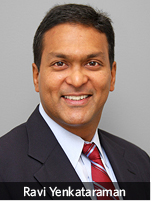The measurement of success of an active portfolio manager should go beyond just whether the investments get good, immediate returns, according to Ravi Venkataraman, chair of the Active Managers Council.
It also should include a reorientation to the long term, how well the manager assesses sustainability and the relevance and value of insights and advice the manager brings to the table, Venkataraman, global head of investment solutions for MFS, a Boston-based investment management firm, said in an interview Monday.
 New measurement frameworks are being brought into the process of judging the success of an actively managed portfolio, he said. The council he chairs was formed three years ago to bring together active managers, in part, so they can explore ways to help advisors in their work with clients and by providing research to educate clients about ways to best use active management.
New measurement frameworks are being brought into the process of judging the success of an actively managed portfolio, he said. The council he chairs was formed three years ago to bring together active managers, in part, so they can explore ways to help advisors in their work with clients and by providing research to educate clients about ways to best use active management.
“Given the short-term world we live in means portfolio returns are often measured on a six-month basis or even every quarter,” Venkataraman said. “Investment discussions tend to center on ‘What have you done for me lately?’ But in almost every instance, the investor has a long portfolio horizon, so it stands to reason that a client should also evaluate an investment manager over the long term, which means at least a full-market cycle, in investment terms. Historically, market cycles have played out over seven to 10 years.”
With the support of their own board, MFS has reversed the way portfolio success is measured, he said.
“We start with the 10 year history, then go to five, then three, then one,” he said. Psychologically, “this shift is a big deal. It prompts the nature of the investment conversation to change. We tell advisors and clients to look at the long term first, which anchors the conversation around drivers of long-term value, performance and risk.”
In addition, examining an active manager's "quality of performance" is also important, he said.
“Metrics such as results over rolling seven-year periods, up-market and down-market performance [and] risk factor exposures are all prompts for rich client conversations,” he said. “You may expect a good manager to outperform the benchmark by 100 to 200 basis points annualized over the long term, but you also want to look at how he or she got there."
Clients have different performance and risk objectives and constraints, so the evaluation in turn has to consider these factors. “Sometimes with the focus on the short term, these important client objectives get lost in the assessment,” he added.
A second shift in the examination of active managers is the stewardship of the money they manage and how they incorporate ESG into the investment process, he said.
"ESG factors and how companies are run have a bearing on both the long-term risks and opportunities of business models and affect the valuation of companies, so we believe a consideration of these issues is inherently an active investment activity," he explained.
“Every industry touches on ESG issues. For instance, consumer companies may not explicitly be heavy users of natural resource, but they likely have significant use of packaging and plastics, so it makes sense to learn their policies related to these issues.” Venkataraman said. “Assessing a company’s impact on the environment, on governance and social issues such as employee work environment, has a direct bearing on the long-term viability of their earnings. If companies do not pay attention to these issues, bad things will happen eventually.”
Venkataraman did not dismiss passive management, but noted that the value-add an active manager brings to the table is his or her insights and thought leadership globally about the markets. Themes across sectors and industries and the companies within them can be very valuable insights for investors, he said.
“Judgment and insight can be particularly valuable at inflection points in the markets, such as can be observed in the macro environment over the past year and a half,” he added. “Ultimately, we make these insights available so we can build stronger relationships with our clients, and we hope this helps them become better investors."








